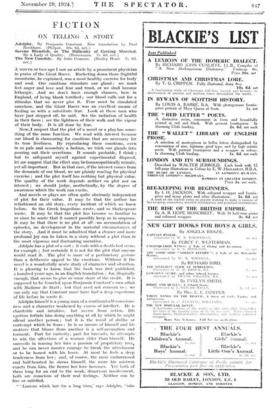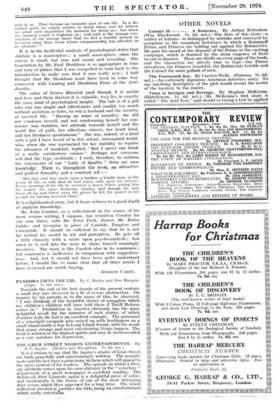FICTION
ON TELLING A STORY
Adolphe. By Benjamin Constant. New translation by Paul Hookham. (Philpot. 10s. 6d. net.) Serena Blandish, or The Difficulty of Getting Married. By a Lady of Quality. (Heinemann. 7s. 6d. net.)
A MONTH or two ago I saw an article by a prominent physician
in praise of the Giant Racer. Bucketing down those frightful mountains, he explained, was a most healthy exercise for body and soul. Our emotions stimulate our gland ; we must feel anger and love and fear and trust, or we shall become lethargic. And we don't have enough chances, here in England, of being blank terrified ; our blood calls out for a stimulus that we never give it. Fear must be simulated somehow, and the Giant Racer was an excellent means of feeding us with a substitute fear. Look at these men who have just stepped off, he said. See the radiation of health in their faces ; see the lightness of their walk and the vigour of their body. It is all done by fear.
Now, I suspect that the plot of a novel or a play has some- thing of the same function. We read with interest because our blood is clamouring for emotions that are necessary for its true liveliness. By reproducing these emotions, even
in so pale and secondary a fashion, we trick our glands into pouring out their secretions. It sounds probable, I think ; but to safeguard myself against experimental disproof, let me suggest that the effect may be homoeopathically minute, yet all important.' But in that case, if the interest comes from the demands of our blood, we are plainly reading for physical exercise ; and the plot itself has nothing but physical value.
The quality of the work depends neither on plot nor on interest ; we should judge, aesthetically, by the degree of awareness which the work can excite.
And novels or plays are often quite obviously independent of plot for their value. It may be that the author has refashioned an old story, every incident of which we knew before. So the Greek tragedians wrote, and so Shakespeare wrote. It may be that the plot has become so familiar to us since he wrote that it cannot possibly keep us in suspense. It may be that there is no plot at all—no accumulation of episodes, no development in the material circumstances of the story. And it must be admitted that a cleaner and more profound joy can be taken in a story without a plot than in the most vigorous and fluctuating narrative.
Adolphe has a plot of a sort ; it ends with a death-bed scene, for example ; but certainly it is not for the plot that anyone
would read it. The plot is more of a perfunctory gesture than a deliberate appeal to the emotions. Without it the novel is a wonderfully acute study of character and situation.
It is pleasing to know that the book was first published, a hundred years ago, in an English translation ; for, illogically enough, that seems to give us some share of the credit. It is supposed to be founded upon Benjamin Constant's own affair with Madame de Stael ; but that need not concern us ; we can only say that Constant must have had a deep experience of life before he wrote it.
Adolphe himself is a young man of a continual self-conscious- ness and a character weakened by excess of intellect. He is charitable and intuitive, but averse from action. His egotism forbids him doing anything at all by which he might offend another person ; but it is the recoil of dislike or contempt which he fears ; he is so unsure of himself and his motives that blame from another is a self-accusation and torment. Part for curiosity, part for bravado, he attempts to win the affections of a woman older than himself. He succeeds in rousing her into a passion of proprietary love, and he can never muster courage to break the attachment or to be honest with his lover. At most he feels a deep tenderness from her ; and, of course, the more embarrassed and half-hearted he shows himself, the more his mistress exacts from him, the fiercer her love becomes. Yet both of them long for an end to the weak, disastrous involvement, both are conscious of their real feelings. Neither can be free or satisfied.
" ' Liaisons which last for a long time,' says Adolphe, ' take
root in us. They become an intimate part of our life. Ina de- tached spirit we calmly resolve to break them, and we believe we await with impatience the moment for doing so ; but when the moment comes it frightens -us ; and such is the strange con- stitution of our strange heart that. we feel a terrible wrench in breaking away 'from those whose companionship has afforded us no pleasure."
It is in the incidental analysis of `psychologicalstates that Adolphe is a masterpiece ; a small masterpiece, since the canvas is small, but true and sound and revealing. The translation by Mr. Paul Hookham is so appropriate in tone and turn of phrase that I was compelled to turn back to the introduction to make sure that it was really new ; I half thought that Mr. Hookham must have been in some way connected with Canning, and Hookham Frere of the Anti-
Jacobin..
The value of Serena Blandish (and though it is satiric and here and there farcical it is valuable, too) lies in exactly the same kind of psychological insight. The tale is of a girl who was' too simple and" affectionate and candid, too much without ambition or force, to win a husband and the security of married life. " Having- no sense of morality, she did not condemn herself, and not condemning herself her con- science was stainless, her attitude towards herself and the world tree of guilt, her affections sincere, her heart kind, and-her freshness spontaneous." She was, indeed, of a kind with a girl I have heard of in this actual, unimagined world, who, when she was reproached for her inability to repulse the advances of mankind, replied, "But• never can think of a really satisfactory excuse:' Perhaps not everyone will find the type creditable ; wish, therefore, to confirm the statements of 'our "Lady of Quality "' from my own knowledge.. There is throughout the book, an attractive and perfect formality and 'a constant wit :— " Her first visit was made upon a banker, a kindly man, in the prime of life, so rich that- ho had many calls upon his inccme. Every morning of his life he received a dozen letters asking him for money for some deserving. charity, and, though. he tore them all up and threw away the pieces he felt the- poorer in his pocket for having received them."
It is a lighthearted story, but it bears witness to a good depth of analytic knowledge..
Mr. John Cournos, as a refreshment in the course of his more serious writing, I suppose, has rewritten Candide for our own times, with Mr. Peter Pock, Junior, Mr. Rufus Gabbe, and Georgina in place of Candide, Pangloss and Cuneg,onde. It- should be sufficient to say that he is not far behind his model in wit and perception. He gets off a little clumsily with a satire upon psycho-analysis ; but when he is well into the story he shows himself amazingly inventive. The story is like Candide also in its coarseness ; but coarseness is inoffensive in comparison with suooestive- ness. And; lest it' should not have been quite understood before, I should like to make clear that all - three novels I have reviewed are worth buying.
ANDREW CAREY.



























































 Previous page
Previous page